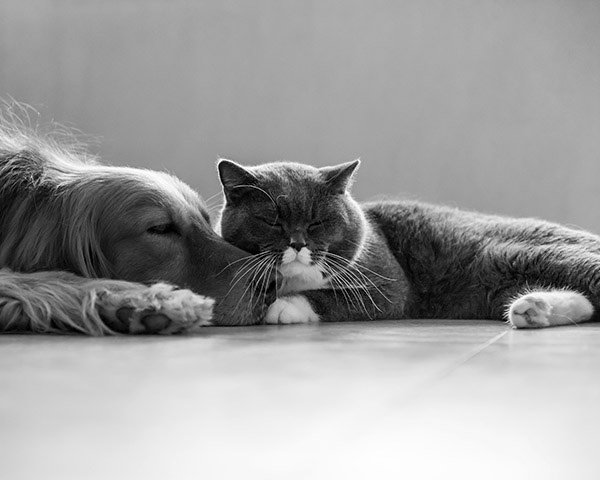St Bernard dog breed information and advice
Larger than life, the St Bernard is an instantly recognisable breed. Loyal, strong and calm, the St Bernard is an eager to please, loyal member of the family.
If you’ve got the floor space, they’re an easy fit into any family thanks to their laid back temperament. Find out more about this gentle giant with our breed guide to St Bernards.
St Bernard facts

| Lifespan | 8 - 10 years |
| How much | £500 - £2,000 |
| Size | 66 - 76 cm |
| Weight | 55 - 82 kg |
| Colours | White patches and orange, mahogany-brindle, red-brindle, black shadings |
| Grooming | Multiple times a week, bathe once a month |
| Temperament | Kind-hearted, tolerant, gentle |
| Exercise | One long walk or half an hour play session |
Pet insurance for your St Bernard
St Bernards are generally a healthy breed but, like many other large dog breeds , are prone to certain health problems and diseases that may require treatment, medication or surgery, including:
Sainsbury’s Bank Pet Insurance
You can take out dog insurance to cover your St Bernard from them being a puppy at eight weeks old.
At Sainsbury’s Bank, we offer three levels of cover:
- Lifetime – full cover with access of up to £7,500 towards vet costs each year.
- Maximum benefit – get cover for each condition up to your chosen policy limit.
- Time limited – protect your pet and get cover for 12 months or up to £3,000 per condition, whichever comes first.
Please note that we won't cover any pre-existing conditions and that terms, conditions, excesses, exclusions and limitations apply.
How to care for a St Bernard
St Bernards are big boys and girls, but that doesn’t mean you can feed them just anything – no matter how obliging they might be. Diet, grooming and exercise are an essential part of caring for your pooch.
Feeding and nutrition
If you’ve got a St Bernard puppy, it’s important to follow the breeder’s instructions and try to keep them on a similar diet, if it’s suitable. Generally, you’ll want to use large to giant-breed puppy formula . Remember, puppies grow fast, so they’ll require more calories and nutrients.
It’s always recommended to follow the advice on the back of the food packaging or to consult your vet if you’re unsure about how much food you need to be giving your furry friend. As the breed can be at risk of getting bloated, it’s advised to feed them smaller meals throughout the day, rather than one big one.
St Bernards are large dogs, and obesity is another concern to be aware of. Diets that support bone health and mobility can be beneficial, given their larger-than-average frame.
Grooming
St Bernards need a bit of maintenance when it comes to grooming. You’ll want to brush them at least three times a week, but good the news is they’ll probably let you. They’ll stay for a cuddle too as they love being affectionate with their owners. You could get them professionally groomed every few months too.
Because of their droopy facial features, St Bernards need a little bit of extra care. With a clean, soft, and damp cloth, you should give their eyes and skinfolds a little clean. It’s a good time to check the ears too, which can be hotspots for infections.
St Bernards are also notorious droolers. Try to give them a wipe around the mouth when you can, and prepare for splashes when they give their mouths a shake.
Exercise
St Bernards are pretty relaxed, and do not have huge exercise needs. 30-minutes of playtime or an hour’s walk is enough. But they’re also able to move more so if you’re taking a hike, your Bernie will be happy to come along.
As with many breeds, they can develop some destructive tendencies if they don’t get enough exercise or mental stimulation. Additionally, the risk of obesity rises, which can do damage to your St Bernard’s joints.
Training
St Bernards are easy to train, quick to learn, intelligent and receptive. Due to their large size, you’ll want to train them early. Not because a St Bernard will struggle to pick things up, but they’re big – so, if they’re left to run amok in a home, it can be more noticeable .
Temperament and behaviour
Gentle, kind-hearted and receptive, St Bernards are a joy to have in the home but can be difficult for some people. Not because they’re stubborn, but even the smallest of behaviours reverberate in a big way, simply due to their size.
Common health problems
St Bernards are stoic and healthy, but there are some common health problems to keep an eye on.
Canine Hip Dysplasia
Hip Dysplasia is a hereditary condition that occurs when dog’s hip joint can’t develop properly. This results in the hip bone grinding, rather than sliding smoothly.
It’s a painful condition that can impact your dog’s mobility. Vets may be able to advise on supplements to ease the symptoms, medication, physical therapy, and best practices.
Diagnosis can only be achieved by a vet, but symptoms usually include reduced mobility, activity levels, reluctance to perform or difficulty performing energetic movements, and hobbling in the hind legs.
Gastric Dilation and Volvulus (GDV)
Gastric Dilation and Volvulus (or simply, bloat) most commonly affects dogs with narrow, deep chests, such as the St Bernard. This bloating fills the affected dog’s stomach with gas and causes it to twist. If left unchecked, the twist can cut off blood supply to the stomach and spleen.
Common signs of GDV can often be spotted during or after eating and include pacing, excessive drooling, dry-heaving, and a low appetite.
Time is of the essence with this conditions and vets can perform emergency procedures to tackle this condition to stop the stomach twisting.
Entropion
This condition interferes with your St Bernard’s eyelid, causing it to roll inward, rubbing fur and eyelashes against the surface of the eye (the cornea.) Surgery can be performed to correct this issue, but left unchecked it can cause corneal ulcers.
So, is a St Bernard right for you?
While a St Bernard might fill a room, it’s calm and loving manner makes it feel like part of the home. They’re understanding, patient, and great with children. Despite their power, a full-grown St Bernard’s is eager to please and easy-going. But you’ll need to have the space for them, and they aren’t suited to apartment living.
Frequently asked questions
Is a St Bernard a good family dog?
Yes, St Bernards are a good family dog. They get on well with children and can also be trained easily. You may need to watch them carefully around smaller children, elderly or vulnerable family members though as they can easily bump into them by accident.
Do St Bernards bark a lot?
In comparison to other dog breeds, not as much. The St Bernard’s calm temperament extends to its behaviours, meaning they’re not a vocal breed. Usually, they’ll only bark to alert their owners. They rarely vocalise without a purpose.
Do St Bernards like to cuddle?
Yes, they do. They’re affectionate and cuddly dogs who love to curl up with you on the sofa – if there’s space. Your affection will always be welcomed with open paws by a St Bernard.

Browse our guides
Choose from our list of helpful guides and information

Explore dog breeds
Find out how to keep your dog healthy and happy

Cat breed guides
How to care for your cat, common health problems and more
Terms and conditions
Important information
Sainsbury's Bank plc, Registered Office, 33 Charterhouse Street, London, EC1M 6HA (registered in England and Wales, no 3279730) is authorised by the Prudential Regulation Authority and regulated by the Financial Conduct Authority and the Prudential Regulation Authority (register no. 184514).
Sainsbury's Supermarkets Ltd is an appointed representative of Sainsbury's Bank plc. Sainsbury's Bank plc acts as an introducer to Pinnacle Insurance Ltd who is authorised by the Prudential Regulation Authority and regulated by the Financial Conduct Authority and the Prudential Regulation Authority (register number 110866). Registered office: 4th Floor, Limelight, Elstree Way, Borehamwood, Hertfordshire, WD6 1JH. Sainsbury’s Bank Pet Insurance is arranged, administered and underwritten by Pinnacle Insurance Ltd. Sainsbury's Bank plc and Pinnacle Insurance Ltd are not part of the same corporate group.
We do not provide personal recommendations to customers.
